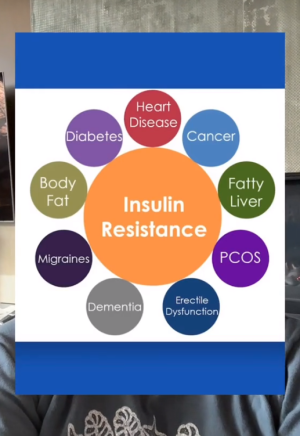Doctor exposes foods that are not as healthy as you think
By
- Replies 12
Disclaimer: This article is not intended to be taken as medical advice, if in doubt, you should seek advice from your trusted medical professional or nutritionist.
We all know there’s no such thing as a miracle food that’ll solve all your problems, but there are certain meals we tend to think of as ‘healthy’ or instinctively assume are better for us.
Fortunately, a doctor has revealed some of these everyday grocery items are not as healthy as they appear!
Medical professional Dr Mijin Brown shared examples of some popular health foods to watch out for.
First items on her list are perhaps the most surprising: fruit juices and fruit.
'Did you know that some fruit juices have as much sugar as a can of soda?' Dr Brown said in a video posted on social media.
'Fruit today, even veggies today, are nothing like they were a long time ago in nature. Most were small, fibrous and not too sweet, but fruit today is crazy.'
Dr Brown cautioned that what was once ‘nature’s candy’ was now engineered to be bigger, sweeter and less fibrous–impacting our blood sugar levels.
She recommends treating high-sugar fruits like mangoes, pineapples, bananas and grapes like dessert and limiting consumption. Interestingly, the Dietary Guidelines for Americans actually recommends adults eat 2 cups of fruit a day. Similarly, the Australian Dietary Guidelines suggest two serves of fruit daily for those aged 18 and over.
Another one is oat milk. Major supermarkets like Coles and Woolworths sell oat milk as an alternative to dairy milk, and while it’s certainly vegan-friendly, Dr Brown reveals it’s 'not as healthy' as we think.
'Oat milk is high in carbohydrates and sugar–plus it has a lot of preservatives, emulsifiers and thickeners. So, if you’re looking for a healthier dairy alternative, try almond or even coconut milk.'
Dr Brown also specified oatmeal, known locally as porridge. It’s controversial for diabetics because they need to limit their carbohydrate consumption.
Even though porridge is a low glycaemic food, other varieties–especially those with additional sugar–are not ideal for people regulating their blood sugar levels.
Dr Brown does not deny that porridge is a great source of fibre, though she recommends avoiding flavoured kinds of porridge, and choosing the ‘steel cut’ as a healthier option.
Unfortunately, rice cakes don’t make the cut as well.
'Rice cakes are low in calories but really, really low in fibre,' Dr Brown said. 'You really need to watch out for their high carb content.'
Dr Brown recommended pairing rice cakes with something containing protein or fat to 'help with being satisfied'.
Though the doctor’s advice is in good faith, others online are still unwilling to heed her recommendations.
An online commenter mockingly said, ‘Is water safe guys?’
‘What the hell are we supposed to eat then??’ another wrote.
‘At this point I’ll eat whatever then hope for the best,’ someone added.
Despite the scepticism, Dr Brown expressed that people can still ‘eat everything in moderation,’ and that she just, ‘want(s) to inform people of the impact of some “healthy” foods on metabolic health’.
‘You can still eat them but be mindful,’ she added.
For the ‘healthy’ foods she debunked, she also recommends substitutes:

Do you have any other advice, tips or any personal stories on healthy eating? We’d love to hear them. Let us know in the comments below!
We all know there’s no such thing as a miracle food that’ll solve all your problems, but there are certain meals we tend to think of as ‘healthy’ or instinctively assume are better for us.
Fortunately, a doctor has revealed some of these everyday grocery items are not as healthy as they appear!
Medical professional Dr Mijin Brown shared examples of some popular health foods to watch out for.
First items on her list are perhaps the most surprising: fruit juices and fruit.
'Did you know that some fruit juices have as much sugar as a can of soda?' Dr Brown said in a video posted on social media.
'Fruit today, even veggies today, are nothing like they were a long time ago in nature. Most were small, fibrous and not too sweet, but fruit today is crazy.'
Dr Brown cautioned that what was once ‘nature’s candy’ was now engineered to be bigger, sweeter and less fibrous–impacting our blood sugar levels.
She recommends treating high-sugar fruits like mangoes, pineapples, bananas and grapes like dessert and limiting consumption. Interestingly, the Dietary Guidelines for Americans actually recommends adults eat 2 cups of fruit a day. Similarly, the Australian Dietary Guidelines suggest two serves of fruit daily for those aged 18 and over.
Another one is oat milk. Major supermarkets like Coles and Woolworths sell oat milk as an alternative to dairy milk, and while it’s certainly vegan-friendly, Dr Brown reveals it’s 'not as healthy' as we think.
'Oat milk is high in carbohydrates and sugar–plus it has a lot of preservatives, emulsifiers and thickeners. So, if you’re looking for a healthier dairy alternative, try almond or even coconut milk.'
Dr Brown also specified oatmeal, known locally as porridge. It’s controversial for diabetics because they need to limit their carbohydrate consumption.
Even though porridge is a low glycaemic food, other varieties–especially those with additional sugar–are not ideal for people regulating their blood sugar levels.
Dr Brown does not deny that porridge is a great source of fibre, though she recommends avoiding flavoured kinds of porridge, and choosing the ‘steel cut’ as a healthier option.
Unfortunately, rice cakes don’t make the cut as well.
'Rice cakes are low in calories but really, really low in fibre,' Dr Brown said. 'You really need to watch out for their high carb content.'
Dr Brown recommended pairing rice cakes with something containing protein or fat to 'help with being satisfied'.
Though the doctor’s advice is in good faith, others online are still unwilling to heed her recommendations.
An online commenter mockingly said, ‘Is water safe guys?’
‘What the hell are we supposed to eat then??’ another wrote.
‘At this point I’ll eat whatever then hope for the best,’ someone added.
Despite the scepticism, Dr Brown expressed that people can still ‘eat everything in moderation,’ and that she just, ‘want(s) to inform people of the impact of some “healthy” foods on metabolic health’.
‘You can still eat them but be mindful,’ she added.
For the ‘healthy’ foods she debunked, she also recommends substitutes:
- Instead of ‘fruit juice’, eat the whole fruit;
- Instead of ‘high sugar fruits’ like mangoes, pineapple and grapes, try limiting them and treat as desserts;
- Instead of ‘oat milk’, try sugar-free almond or coconut milk;
- Instead of ‘porridge’, try plain coconut yoghurt; and,
- Instead of ‘rice cakes’, try swapping for celery sticks.
Key Takeaways
- Dr Mijin Brown revealed five common foods that people mistakenly regard as healthy: fruit, fruit juices, oat milk, oatmeal, and rice cakes.
- Dr Brown claims modern fruit has been engineered to be bigger and sweeter, potentially affecting blood sugar levels. She also highlights the high levels of carbohydrates, sugars, added preservatives, emulsifiers, and thickeners in oat milk.
- She recommends consuming approximately 2 cups of fruit daily and treating certain fruits like mangoes, pineapples, bananas and grapes as a dessert. She also suggests avoiding flavoured porridge and opting for steel-cut oats instead.
- Despite some online criticisms, Dr Brown urges people to consume everything in moderation and provides alternative options such as sugar-free almond or coconut milk, whole fruit instead of juice, plain coconut yoghurt instead of porridge, and celery sticks in place of rice cakes.
Do you have any other advice, tips or any personal stories on healthy eating? We’d love to hear them. Let us know in the comments below!









